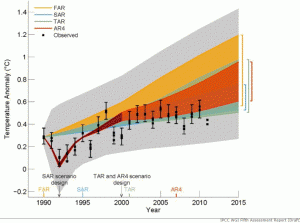Yesterday I posted on a new study from Nicola Scafetta, which found indications that the sun plays a far greater role in climate change and that CO2 climate sensitivity is pegged too high.
A number of large studies have come out over the last couple of years and months showing the same. No wonder the IPCC is under pressure to scale back its projected temperature rise by the year 2100.
The Economist here has seen an unpublished draft copy of the 5th Assessment Report. Some excerpts from the Economist article (my emphasis):
According to one table from the unpublished report, which was seen by The Economist (above), at CO2 concentrations of between 425 parts per million and 485 ppm, temperatures in 2100 would be 1.3-1.7°C above their pre-industrial levels. That seems lower than the IPCC’s previous assessment, made in 2007. […]
It is clear that some IPCC scientists think the projected rise in CO2 levels might not have such a big warming effect as was once thought.
In the new draft, the lower end of the range has been reduced to 1.5°C and the “most likely” figure has been scrapped. That seems to reflect a growing sense that climate sensitivity may have been overestimated in the past and that the science is too uncertain to justify a single estimate of future rises. If this does turn out to be the case, it would have significant implications for policy.”
Of course the IPCC will continue to insist that a catastrophe is coming, unless we hand the reigns of power and decision-making over to environmental elitists. It’ll be interesting to see if they disappear the following graphic, which appeared in a leaked draft late last year:
My bet is that it will not see the light of day in the final report. The 5th assessment report will be the IPCC’s last chance.






There is a very good reason why the recent global temperatures have flatlined. The climate sensitivity decreases with increasing temperature. The temperature can only increase to a certain point, then the decreasing climate sensitivity will act to prevent any further increase. We have already reached that point. For proof, I offer this analysis using CERES satellite data by Willis Eschenbach:
http://wattsupwiththat.com/2012/06/19/a-demonstration-of-negative-climate-sensitivity/
Note in this analysis that when the temperature reaches the range of 25 to 30°C, the climate sensitivity goes negative. It is already negative over the tropical oceans. The reason for this is afternoon thunderstorms pumping heat to the top of the atmosphere where it can radiate to space.
Some scientists’ recent views I found should be more widely quoted are on my blogsite at http://t.co/vZKx895Hty amongst other considerations, including some IPCC revelations in my post of 04 October 2011
One more thought on the Economist: The most striking comment in the Economist article is (para 5): “…There are several caveats. The table comes from a draft version of the report, and could thus change. It was put together by the IPCC working group on mitigating climate change, rather than the group looking at physical sciences…..”. In other words, look forward to the usual IPCC forked tongue announcements for which best see Donna Laframboise’s book “The Delinquent Teenager, who was mistaken for the world’s top climate expert”. As to ‘climate models’ – I couldn’t find a single one yet, viz http://cleanenergypundit.blogspot.co.uk/2013/01/snippets-questions-2-climate-models.html ff.